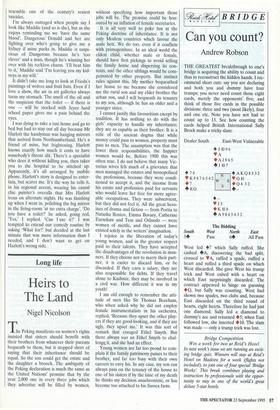Long life
Heirs to The Land
Nigel Nicolson
The Peking manifesto on women's rights insisted that sisters should benefit with their brothers from whatever their parents bequeath to them, but it stopped short of saying that their inheritance should be equal. So the son could get the estate and the daughter a brooch. The ambiguity of the Peking declaration is much the same as the United Nations' promise that by the year 2,000 one in every three jobs which they advertise will be filled by women, without specifying how important those jobs will be. The promise could be hon- oured by an inflation of female secretaries.
It is all very well to poke fun at the Peking doctrine of inheritance. It is not only Moslem countries which favour the male heir. We do too, even if it conflicts with primogeniture. In an ideal world the eldest child, whether male or female, should have first pickings to avoid selling the family home and dispersing its con- tents, and the other siblings would be com- pensated by other property. But instinct rules against this. My mother bequeathed her house to me because she considered me the rural son and my elder brother the urban son, and I will bequeath its tenancy to my son, although he has an older and a younger sister.
I cannot justify this favouritism except by tradition. It has nothing to do with the girls' capacity to handle my inheritance; they are as capable as their brother. It is a relic of the ancient dogma that while money could pass to women, property must pass to men. The assumption was that the fewer their responsibilities, the happier women would be. Before 1900 this was often true. I do not believe that many Vic- torian wives felt much of a grievance that men managed the estates and monopolised the professions, because they were condi- tioned to accept it, and the income from his estate and profession paid for servants who would leave her free for more agree- able occupations. They were subservient, but they did not feel it. All the great hero- ines of drama and fiction — from Portia to Natasha Rostov, Emma Bovary, Catherine Earnshaw and Tess and Orlando — were women of mettle, and they cannot have existed solely in the writers' imagination.
I rejoice in the liberation of today's young women, and in the greater respect paid to their talents. They have accepted the disadvantages of the revolution in man- ners. If they choose not to marry their part- ner, it is easier to discard him, or be discarded. If they earn a salary, they are also responsible for debts. If they travel alone to Kashmir, they may be involved in a civil war. How different it was in my youth!
I am old enough to remember the atti- tude of men like Sir Thomas Beecham, who when asked why he did not employ female instrumentalists in his orchestra, replied, `Because they upset the other play- ers if they are good-looking, and if they are ugly, they upset me.' It was this sort of remark that enraged Ethel Smyth. But there always was an Ethel Smyth to chal- lenge it, and she had an effect.
Young women are far too proud to com- plain if the family patrimony passes to their brother, and far too busy with their own careers to envy his. In any case, my son can always pass on the tenancy of the house to one of his sisters if by the time of my death he thinks my decision anachronistic, or has become too attached to his Sussex farm.


































































 Previous page
Previous page